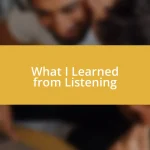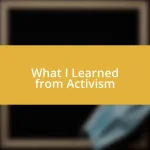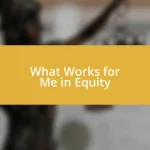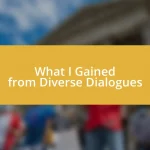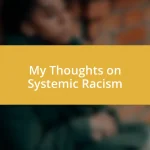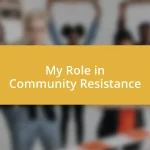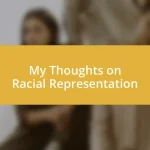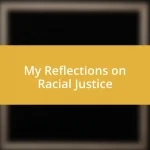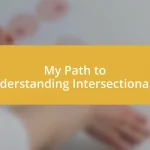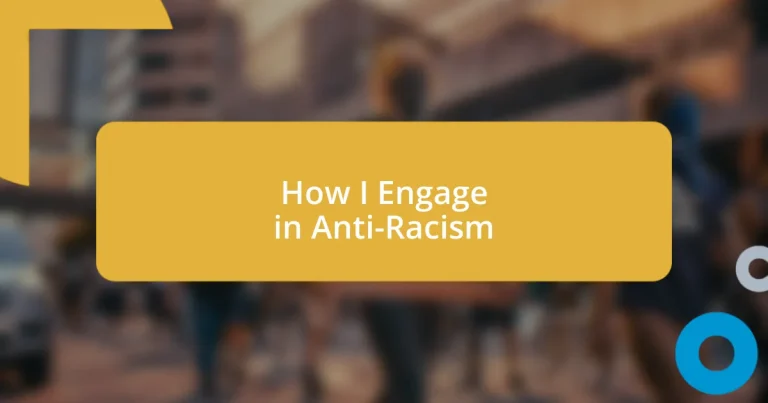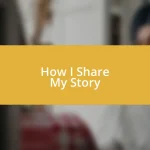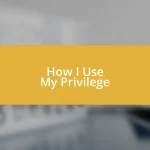Key takeaways:
- Anti-racism involves active engagement and self-reflection, challenging personal biases and privileges.
- Listening to marginalized voices is essential; attending community discussions can reshape understanding and foster empathy.
- Learning from various anti-racism resources broadens perspectives and encourages responsibility towards societal change.
- Supporting and advocating for anti-racist organizations amplifies efforts towards racial equity and community empowerment.
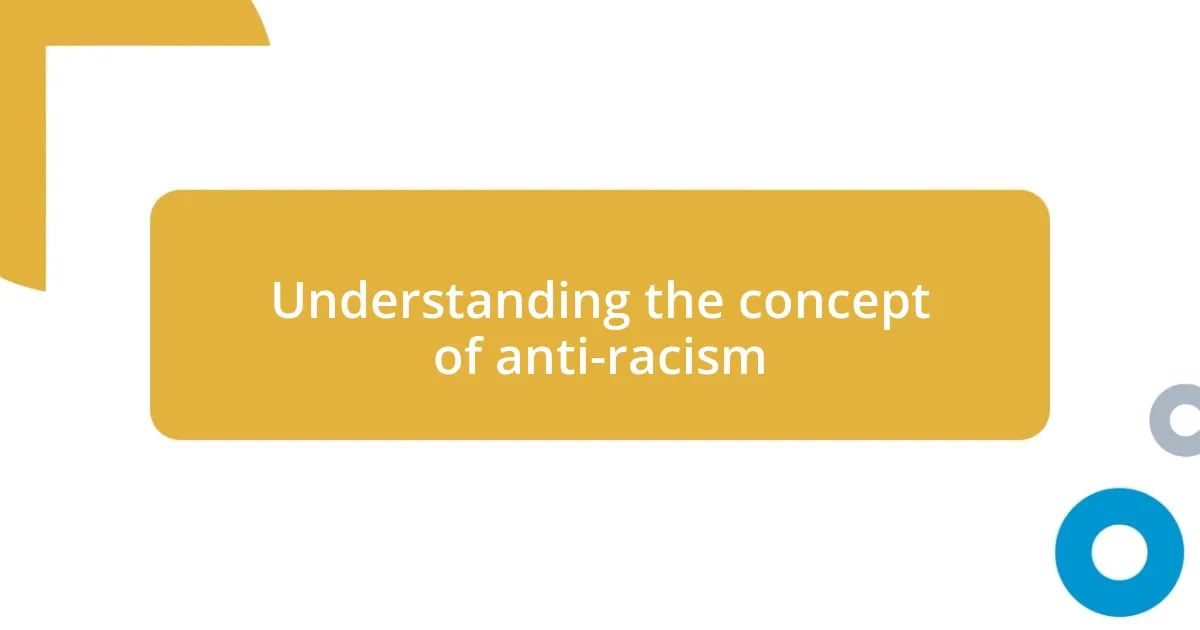
Understanding the concept of anti-racism
Anti-racism goes beyond simply saying one is not racist; it involves actively challenging and opposing racism in all its forms. I remember a time when I overheard a conversation where a friend casually made an offhand joke about a racial stereotype. It took courage to speak up, but I realized that silence would only contribute to the problem. I couldn’t help but wonder: How many moments have I let slide without confronting them?
Understanding anti-racism means recognizing that it requires constant effort and self-reflection. There’s this powerful feeling of discomfort that accompanies acknowledging my own biases. I’ve learned that it’s not just about external actions, but about digging deep within myself to uncover prejudices I didn’t even know existed. Do you ever pause and think about the subtle ways racism can sneak into our everyday lives?
This journey also involves listening to marginalized voices and amplifying them in conversations where they might otherwise be drowned out. I vividly recall attending a community forum where individuals shared their stories of racial discrimination. It was profound to sit in that space, listen, and absorb their experiences, feeling both the weight of injustice and the hope for change. In these moments, I ask myself, “What can I do to ensure their voices are heard?”
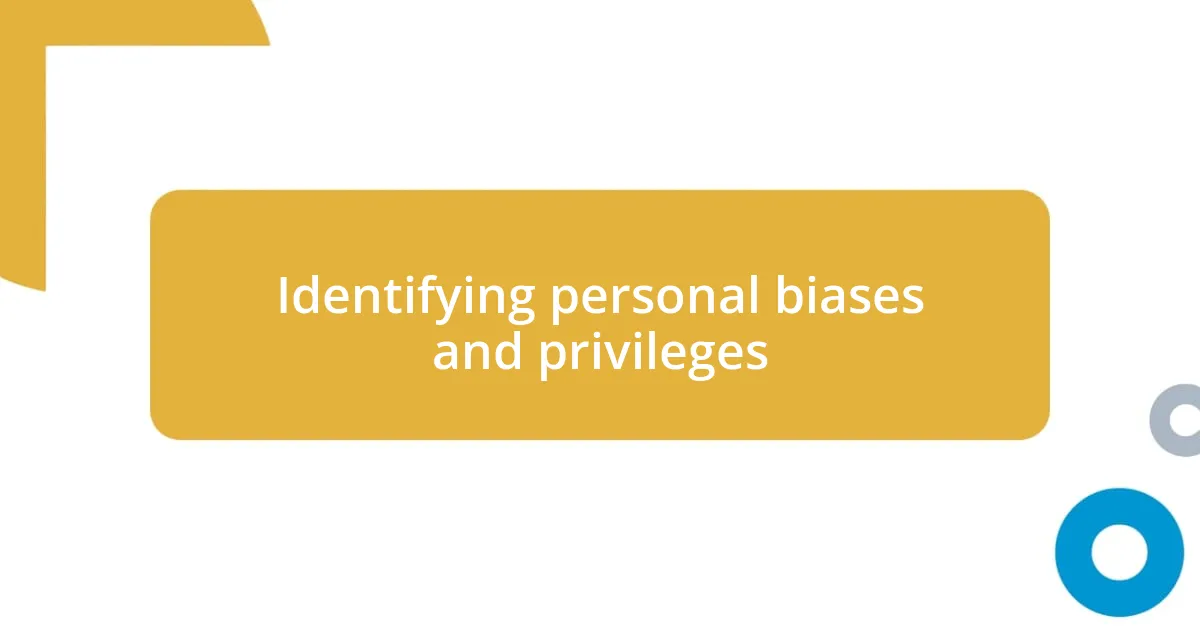
Identifying personal biases and privileges
Identifying our personal biases and privileges is a crucial step in engaging with anti-racism. I remember a workshop I attended, where we were asked to reflect on our background and how it shapes our interactions with others. It struck me how many unearned advantages I’d taken for granted, like my skin color or the neighborhood I grew up in. It was a startling realization that these factors influence not just the opportunities I receive but also how people perceive me in social settings.
This self-examination can be uncomfortable, but it’s necessary. I’ve had moments where I felt defensive when someone pointed out my privilege. Instead of shutting down, I learned to lean into those feelings and listen. The more I engage with the discomfort, the clearer I see the systemic inequalities we face. Have you ever felt caught off-guard when your biases were brought to light? Those moments can be powerful transformation catalysts.
To truly embrace anti-racism, it helps to understand how our biases play out in daily life. For instance, I recently had a conversation with a colleague who shared her experiences navigating a workplace that wasn’t always welcoming to her. When I reflected on my own experiences in that space, I realized I hadn’t seen things from her perspective. That conversation pushed me to become more aware of how my actions might inadvertently perpetuate inequities, prompting me to actively seek out diverse voices in my environment.
| Biases | Privileges |
|---|---|
| Examples of personal biases I’ve identified | Examples of privileges I can recognize |
| Stereotypes based on appearance | Access to quality education |
| Assumptions about people’s abilities | Freedom from racial profiling |
| Preconceived notions based on socioeconomic status | Representation in media and leadership roles |
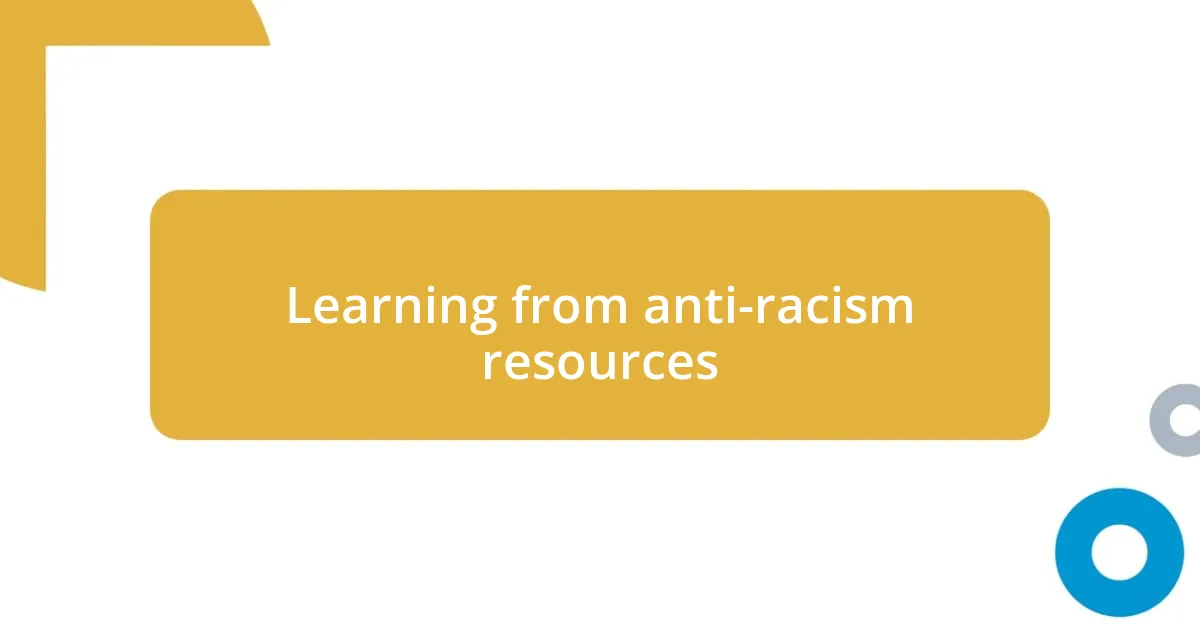
Learning from anti-racism resources

Learning from anti-racism resources
Delving into anti-racism resources has been an enlightening part of my journey. I recall picking up a book on systemic racism that made my head spin with new concepts. At first, it felt overwhelming, but as I kept reading, the pieces started to fit together, revealing a complex web of societal issues that mirrored my own experiences and observations. It’s fascinating how literature can open our eyes to the realities we often overlook.
I often find that different types of resources offer unique perspectives. Some of my favorites include:
- Books that explore historical contexts of racism, helping me understand long-standing issues.
- Podcasts featuring voices from diverse communities, which provide a platform for real, lived experiences.
- Documentaries that challenge my assumptions and prompt critical discussions.
Every resource I’ve engaged with has shifted my perspective, making me question not just what I know but how I act. For instance, watching a documentary on the civil rights movement invoked a profound sense of responsibility in me. The bravery of those individuals standing up against injustice made me reflect on my own actions; am I doing enough to be a part of that change? I believe it’s crucial to continually seek out and learn from these resources, as they shape my understanding and commitment to anti-racism.
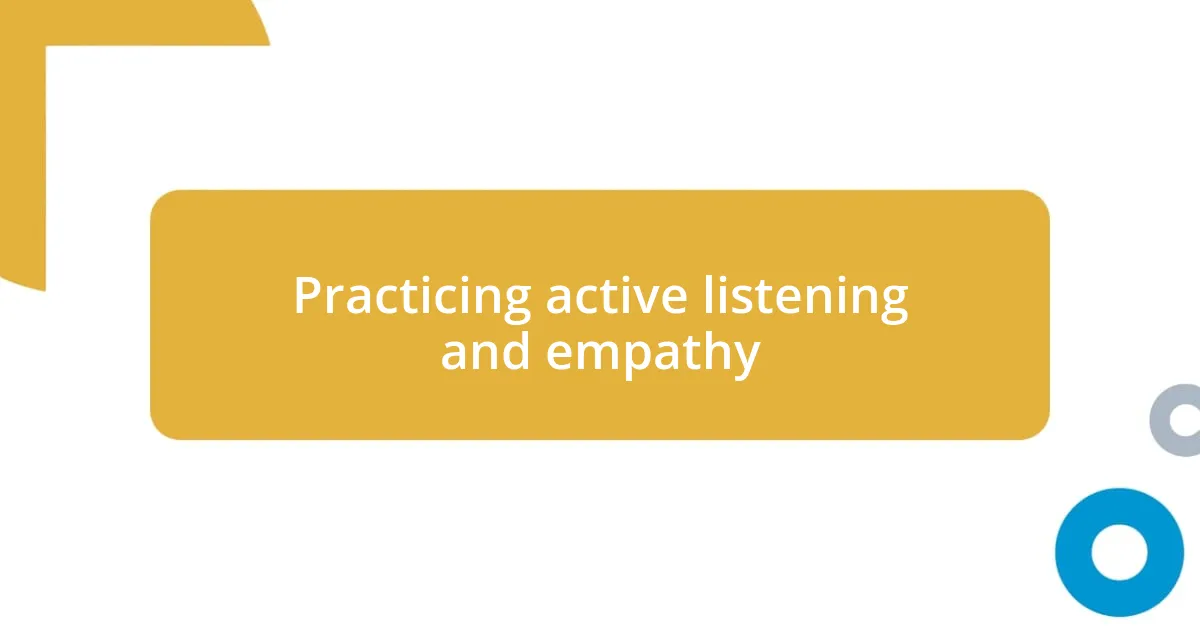
Practicing active listening and empathy
Practicing active listening and empathy has been a game changer for me in my anti-racism journey. I vividly recall a conversation with a friend of mine, who shared her experiences of racial discrimination in her childhood. As she spoke, I put away my preconceptions and truly listened, allowing her feelings to resonate with me. It struck me just how vital it is to create a space where others feel safe enough to share their stories. Have you ever listened deeply to someone’s experience, only to realize just how little you understood before that moment?
In moments of vulnerability like this, I’ve learned that empathy goes beyond mere understanding; it demands an emotional connection. After hearing my friend’s story, I couldn’t help but feel a pang of guilt mixed with compassion. It reminded me that our shared humanity is often overshadowed by systemic issues that create distance. Those feelings compelled me to reach out more often and ask, “What can I do to support you?” This simple question has opened doors to genuine dialogue, enriched by the realization that I may never fully grasp someone’s lived experience, yet I can still stand in solidarity.
Active listening isn’t just about hearing the words; it’s about feeling the weight of the emotions behind them. I remember a community meeting where I listened to several speakers share their personal narratives about racism. The pain and frustration etched on their faces was palpable, and it ignited a deep commitment in me. Moments like that make me ponder: Are we truly listening, or are we just waiting for our turn to speak? This practice cultivates a deeper awareness within me, pushing me to seek understanding before responding, fostering a culture of empathy rather than defensiveness.
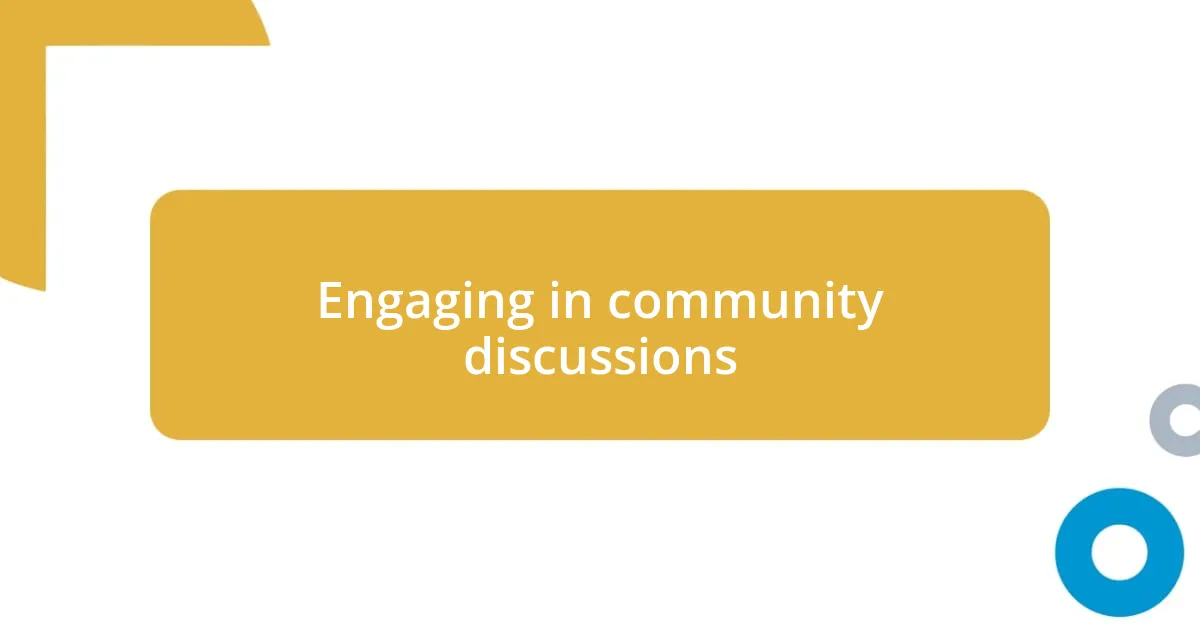
Engaging in community discussions
Engaging in community discussions about anti-racism has been a transformative experience for me. I vividly recall attending a town hall meeting where individuals from diverse backgrounds shared their experiences and perspectives on race. It was eye-opening to hear stories that contradicted my own assumptions. Have you ever felt the weight of a shared story that reshaped your understanding of a community? I did that night, and it compelled me to reflect on my position within these conversations.
What I’ve come to appreciate is how community discussions serve as both a mirror and a window. They reveal not only our own biases but also open up new viewpoints we might not have considered otherwise. During one particularly poignant discussion about local policing practices, I felt a lump in my throat listening to a mother recount her fear for her children’s safety. It drove home the importance of actively participating in these dialogues, not just as a listener, but as a contributor who acknowledges the shared urgency for change.
These discussions aren’t always comfortable, and that’s okay. I remember a panel in which I was challenged to confront my own biases when someone asked me how I would respond to being called out for a microaggression. My initial instinct was to defend myself, but I paused and considered the intent behind the question. Engaging in these conversations often requires vulnerability, which can lead to deeper connections within the community. Have you ever been taken aback by the realization of how much there is still to learn? That moment taught me that discomfort can be the bridge to understanding, pushing me to stay committed to not just speaking up but listening actively.
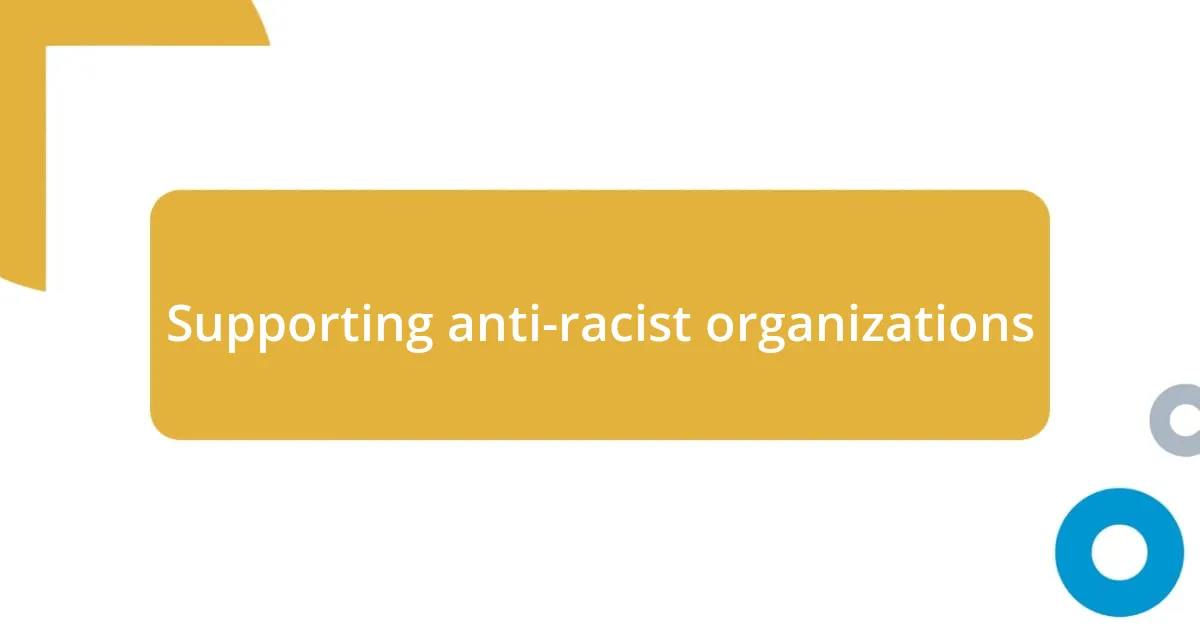
Supporting anti-racist organizations
Supporting anti-racist organizations is a crucial way for me to contribute to the larger movement. One time, I volunteered at a local nonprofit focused on educating youth about racial equity. It was inspiring to see how dedicated individuals created programs that empowered young voices. Have you ever felt the energy in a room filled with passionate people working toward a common goal? That experience energized my commitment to fight against racism.
I’ve also regularly contributed financially to organizations that align with my values. Each donation feels like an investment in change, not just for me, but for communities that are often marginalized. I remember the first time I made a donation to an anti-racism initiative—there was this rush of satisfaction, knowing I was supporting efforts that challenge systemic injustices. This made me realize: how often do we overlook the power of our resources in the fight for equity?
Additionally, sharing resources and information about these organizations has become an important part of my advocacy. I often find myself discussing anti-racist efforts with friends, encouraging them to get involved. One day, at a coffee shop, I shared an article about an organization I support, sparking a passionate conversation. It reminded me how vital it is to amplify these organizations and engage others in dialogue. Have you considered how your voice can uplift the work of those fighting against racism? Finding ways to share these stories can inspire others to take action too.

